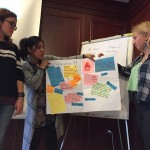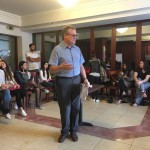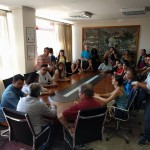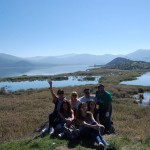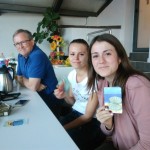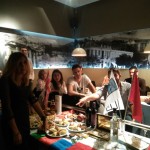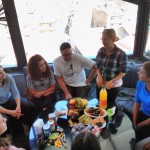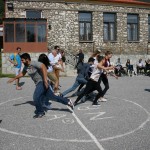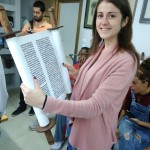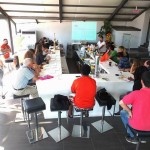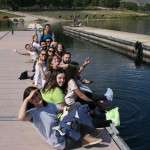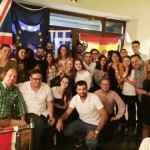 From September 25 to October 2 in Florina (Greece) a training program for young people from 8 countries was held. It was organized with the support of the EU in the framework of Erasmus+ programme, and implemented by the youth organizations Momentum World (UK) and Active Youths (Greece). The aim of the project was to give young people a better understanding of the benefits of international youth programmes and teach them to motivate themselves, develop their skills and work within the Erasmus+ programmes.
From September 25 to October 2 in Florina (Greece) a training program for young people from 8 countries was held. It was organized with the support of the EU in the framework of Erasmus+ programme, and implemented by the youth organizations Momentum World (UK) and Active Youths (Greece). The aim of the project was to give young people a better understanding of the benefits of international youth programmes and teach them to motivate themselves, develop their skills and work within the Erasmus+ programmes.
Representatives of non-governmental organizations from 8 different countries, namely Greece, United Kingdom, Turkey, Croatia, Spain, Azerbaijan, Georgia and Ukraine, took part in this project.
The training programme consisted of 2 parts. In the morning international teams performed the tasks, and in the afternoon the teams were to make the deconstruction of their tasks and they had to put themselves into the place of organizers to more fully understand how difficult it is to organize a similar task taking into account the risks and organizational aspects. In addition, every day we completed the factory of learning, that was represented by the flipchart with 6 main questions that every participant had to answer every day. Those questions included: 1 – Product (What did you learn and how did you understand that you had learned this?), 2 – Ingredients (What did you personally do to improve the learning process?), 3 – Marketing and sales (What did you get from the training? Where can you use what you got in the future?), 4 – The owner of the company (What did you feel during this learning process? Emotions.), 5 – Equipment (What did you learn from the place where the event took place?), 6 – Staff (Were other people involved in your learning process? If so, how?). Every evening we answered all these questions and it helped us better understand the value of the training, the results from every training and also we understood how many components a learning process includes and that all these elements must be considered when the organization has its own training.
Day 1. During the first meeting out coaches Andrew (Great Britain) and Kostas (Greece) organized several interesting games that helped participants quickly remember each other’s names and learn more about each of us. After this training, no one had any difficulty with remembering names of other participants and in just a few hours there were no verbal or psychological barriers in communication. Then we formed international groups, each group received a camera and objectives. This task was a kind of quest. We were given a map and instructions that we had to complete. So we could not only improve our communication skills, learn how to work in a team, develop our creativity, but also walk around the charming Greek town of Florina and visit all the famous places in this town (monument of Santa Claus, bear, church, flying bike, trees and twins etc.). In the evening, every country had the opportunity to represent their culture, national dishes and drinks on the intercultural party that helped the participants become more close. After all, there is nothing that can make people from different countries closer than understanding of the culture and traditions of the countries they are from.
Day 2. The training programme began much earlier than the day before it. We visited the local Pedagogical University, where the teams were given two tasks. Some of them had to create a newspaper, and the others were to film the TV news. The main requirement was the involvement of the local community (especially students) in the process, because only they could help us fully reveal issues such as “Sport in Florina”, “Touristic attractions”, “Places for entertainment”, etc. In addition, this university has an academic subject that distinguishes it from all other universities across Greece. This academic discipline includes the process of creating a book, from binding the book to its content. A very interesting fact is that students produce books themselves completely, being able to express their creativity and individuality. In the framework of the program we visited a single bibliographic laboratory in Greece, where students can print text books themselves (but of course, they print those books not in a modern way, but with ink and metal letters, from which the words consist). This process is very time consuming and lengthy, and we were also given the opportunity to try to bind a few pages that appeared to be not a simple task.
A very interesting part of the programme was the meeting of the participants with the deputy governor of the city of Florina. We had the opportunity to talk to him about youth projects, Florina, solution of the problems of this city.
After lunch, we presented the results of our work, made the deconstruction of our tasks and put ourselves in the place of organizers. In addition, each team was given a sheet of paper with the problem that may arise during the organization of international programs, and we had to find a solution to this problem and prevent its occurrence. This task was very useful for each young worker who strives to create future youth projects, because it helped us fully consider the risks and prevent their formation.
Day 3. This day was the most eventful, because we had a large number of tours across the surroundings of Florina. Firstly, we visited the Historical Museum, located in the old village. We learned about the interesting history and rich cultural life of the Greek population, we had a chance to see national clothes of the Greek, craft equipment and arrangement of the old huts. We were surprised by the fact that the Greek traditions and customs were similar to those of a few countries that participated in this project. After that we had a couple of free hours, and we all played different active games, which all raised the mood, and helped us work as an international team.
Then we visited the local winemaking industry Alpha State, where we could see the process of making wine, learn some interesting facts about wine, and visit the wine cellars. At the end of the tour we were invited to taste the best wines of the company. After lunch we were taken to the local lake, where we had plenty of opportunity to talk, relax and take pictures. Then we returned to the hotel to perform the second part of our training and complete the factory of learning.
Day 4. On the fourth day we visited the local historical museum where we could see the ancient Greek statues, hear a little historical information about Greece and peaceful town of Florina.
Then we again were divided into groups, each group received 2 euro and got an interesting task to organize a coffee break themselves. So only with 2 euro we had to find the more food we could.
This kind of task raised our mood and we went in search of food. We went to every store, explained that we were the project participants, and offered some help, for which we would have given a little food, bargained, asked. All this has brought us a lot of positive emotions, to us because no one expected that the Greek people would be so generous and open to help.
As a result, each team brought food for a total of 25 – 30 euro, although they had only 2 euro of the seed money. This problem helped participants overcome their barriers, learn to work in a team, demonstrate their leadership skills and creativity, and just gave us a lot of positive emotions. In the afternoon, Tony (from Great Britain) proposed a training that will help us as the organizers of future projects and youth programs fully involve all participants in the learning process. In addition, he taught us how to act when there are problematic participants in the team who flatly refuse to work. Thus, his training was excellent, and after this training we all got new knowledge on how to work more efficiently in a team.
Day 5. Next day we were offered a trip to the Lakes Prespa (Prespa Lakes) that are in the World Heritage List of UNESCO. Here we found a lot of information about the flora and fauna of Greece, and the rare birds that live in this lake. We also had the opportunity to monitor their behaviour with binoculars. These lakes contain borders between three states: Greece, Albania and the Republic of Macedonia. The charming beauty of the landscape and peaceful atmosphere left nobody indifferent. Then we were divided into small groups and created products with natural materials we could find in the neighbourhood. The result had to reflect the internal state of the team members.
Day 6. At the end of the training programme, we had a very important training aimed at teaching the participants how to write projects for funding under the Erasmus+ program. Experienced trainers and project organizers shared their experiences in the field of project management. We learned how to fill out application forms, search for partners of the project, etc. We have completed the training, not only with new knowledge and skills, but also with the desire to initiate new joint projects with new friends.
For lunch, the deputy governor invited us to a good place with charming scenery. In the evening we had a farewell party. All participants received certificates of participation in the programme and unforgettable memories.
Press service of the European School “Alliance” and project participants from Uzhgorod, Uzhgorod National University students: Nataliya Nosa, Victoria Kaptsosh and Alina Nosa.

